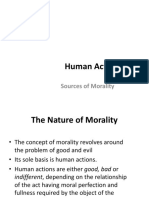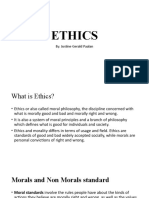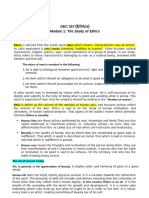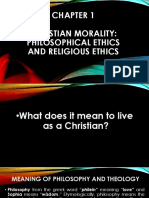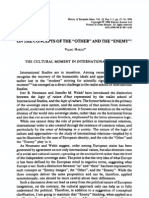0 ratings0% found this document useful (0 votes)
12 viewsChristian Morality 2021 PDF
Christian Morality 2021 PDF
Uploaded by
Samantha De la CruzThe document discusses ethics and morality, defining them and explaining their differences. It outlines key concepts in morality like the notions of good and evil, and how morality relates to human fulfillment and society. It also discusses different approaches to morality between cultures.
Copyright:
© All Rights Reserved
Available Formats
Download as PDF, TXT or read online from Scribd
Christian Morality 2021 PDF
Christian Morality 2021 PDF
Uploaded by
Samantha De la Cruz0 ratings0% found this document useful (0 votes)
12 views73 pagesThe document discusses ethics and morality, defining them and explaining their differences. It outlines key concepts in morality like the notions of good and evil, and how morality relates to human fulfillment and society. It also discusses different approaches to morality between cultures.
Original Title
Christian-Morality-2021-pdf
Copyright
© © All Rights Reserved
Available Formats
PDF, TXT or read online from Scribd
Share this document
Did you find this document useful?
Is this content inappropriate?
The document discusses ethics and morality, defining them and explaining their differences. It outlines key concepts in morality like the notions of good and evil, and how morality relates to human fulfillment and society. It also discusses different approaches to morality between cultures.
Copyright:
© All Rights Reserved
Available Formats
Download as PDF, TXT or read online from Scribd
Download as pdf or txt
0 ratings0% found this document useful (0 votes)
12 views73 pagesChristian Morality 2021 PDF
Christian Morality 2021 PDF
Uploaded by
Samantha De la CruzThe document discusses ethics and morality, defining them and explaining their differences. It outlines key concepts in morality like the notions of good and evil, and how morality relates to human fulfillment and society. It also discusses different approaches to morality between cultures.
Copyright:
© All Rights Reserved
Available Formats
Download as PDF, TXT or read online from Scribd
Download as pdf or txt
You are on page 1of 73
Ethics: Moral philosophy
Provides principles on the morality of human acts
Provides a theoretical knowledge of the morality of human acts
Provides bases of right or wrong and good or bad actions.
Ethics: Moral philosophy
It does not necessarily follow that man does what he knows.
Ethics does not actually guarantee that man will be moral.
One can be moral when one applies ethics (theory).
Morality: Moral Theology
• The praxis (practice) of the ethics
(theory)
• Properly called applied ethics
• Actualizes the theory into a real
action
• The doing of ethics
What does “moral”
mean?
(Moral: Latin Mores:
customs, habitual
ways of doing things)
Customary ways of
doing things can, of
course, be either right
or wrong, good or evil.
When we say that
something is “moral”
we generally mean
that it is “good”.
In morality, the
fundamental value is always
the human person
and the person in
relationship with society.
.
We belong to society and the human community
by the very nature of our birth;
thus, personal morality can never be divorced from
our responsibilities as members of that society
Since customs, practices, habitual
ways of doing things vary from
culture to culture, it can be
expected that there will be
varying approaches to
morality.
The major issue in these varying approaches to morality is that people
have different views of what is good or evil.
Good or Evil
•Every human person has an innate
tendency to seek his or her fulfilment
and perfection.
The mere fact of being alive and being
human means that one has purpose, one
has goals, one seeks meaning in life.
Also it means that one has needs
and desires pursuant to keeping
oneself alive and seeking one’s own
fulfillment.
This fulfilment, or perfection, we call “the good”.
Hence, we can state another fundamental truth:
Anything contributing to the full actualization of
human potential and the proper development of the
human person is good or moral.
Those who believe
in God see and
understand God as the
final end and
purpose of human
life, the supreme
good.
Just as anything that contributes to the
proper growth and development of the
human person is good, so anything that
frustrates or acts against this proper
growth and development is considered
to be evil.
What are some of the things that
frustrate human life and
development, and which everyone
would therefore consider evil?
Here is a partial list: Death, suffering, pain,
disability, Deprivation of freedom, Discrimination
that deprives one of opportunity to improve
oneself, Deprivation of worth and self-esteem.
We call these pre- moral evils ( that is, evils in the
objective sense before any moral slant has been
added).
Human beings may be
deprived of what they
need for their growth and
development as persons in
different ways.
One way that pre-moral evil may be
caused is by natural disaster such as
earthquakes, floods, epidemics,
accidents and in general, things which
are outside of human control.
We call such evils “physical evils”. But as
we know quite well, most of the evil in
the world does not occur in this way.
Most evil in the world is brought on by the free,
deliberate and unjustified actions of human beings.
• We call such evils “moral evils”. And so, moral
evils occur when we voluntarily and deliberately
become involved in the spread of pre-moral evil.
SOME IMPORTANT CONSIDERATIONS
1. Morality has to do
with who and what we
are as human beings
and with our
legitimate
development as
persons.
SOME IMPORTANT CONSIDERATIONS
2. Authority does not
create morality.
SOME IMPORTANT CONSIDERATIONS
3. Immoral and illegal
are not the same thing.
Two presuppositions in
Moral Theology
1. Man possesses freedom of will
• Men experience themselves not merely as
instruments in the hands of higher forces, but as
creative agents.
• Able to choose among alternatives
• Capable of self-determination
2. Man is accountable to an ultimate
value or authority
• From the commitment to this ultimate value, human
life receives its ultimate meaning
• The existence of God and man’s accountability to an
ultimate value are not two separate presuppositions
Division of
Moral Theology
General Morals
• Treats the general presuppositions of the moral act and
its qualities that it may contribute to human’s final goal
• Why the action has to be done?
• Ethics of being
Special Morals
• Treats the human action
• What action has to be done?
• Ethics of doing
2 Subdivisions of Special Morals
• Man’s responsibility in the
religious realm: God
•Man’s responsibility towards the
created world: neighbor &
creation
BASES OF MORAL THEOLOGY
•Divine Revelation (Christian Faith)
OLD TESTAMENT
NEW TESTAMENT
TRADITION (Church Teachings)
•Reason (human intelligence)
What is the Challenge then to our
Christian moral living?
Jesus’ teachings about love have
two dimensions:
Vertical (pointing to God)
Horizontal (pointing to others)
Faith in God alone is not
enough in order to live a
good life. We must also
love our neighbor.
On The Catholic Faith
The Catholic Faith teaches that “wrong is wrong,
even if everyone is doing it.”
And that “right is right, even though no one else
is doing it.”
You might also like
- Ge8 Ethics Learning-Module-1Document13 pagesGe8 Ethics Learning-Module-1Carmina Estes100% (4)
- Psionic Psupervillain: A Celebration of Creative Social DevianceDocument154 pagesPsionic Psupervillain: A Celebration of Creative Social DevianceTanja Watz100% (5)
- Grand Strategy of The ReptiliansDocument28 pagesGrand Strategy of The ReptiliansLinda Denney83% (6)
- Lesson 2 3 Introduction To Morality Meaning and PresuppositionsDocument7 pagesLesson 2 3 Introduction To Morality Meaning and PresuppositionsMeah Angela GulacNo ratings yet
- Business Ethics 3Document98 pagesBusiness Ethics 3Margaret LachoNo ratings yet
- EthicsDocument45 pagesEthicsHidden Machine SlavNo ratings yet
- ETHICSDocument63 pagesETHICSChiharu Jane Alegado100% (1)
- RVED 3 Reviewer PrelimsDocument5 pagesRVED 3 Reviewer PrelimsKarylle AguilaNo ratings yet
- A Preliminary Inquiry Into The Nature and Foundations of MoralityDocument18 pagesA Preliminary Inquiry Into The Nature and Foundations of MoralityagnoagnoNo ratings yet
- Ethics NotesDocument43 pagesEthics NotesJisoo KimNo ratings yet
- Why Do We Need Study Ethics Lesson 2Document23 pagesWhy Do We Need Study Ethics Lesson 2Yukihira SomaNo ratings yet
- Ethics ReviewerDocument5 pagesEthics ReviewerSharivie LlandelarNo ratings yet
- Philosophy, Ethics & MoralityDocument34 pagesPhilosophy, Ethics & MoralityRr NgayaanNo ratings yet
- MoralityDocument6 pagesMoralityemanang07No ratings yet
- The Study of EthicsDocument21 pagesThe Study of EthicsDrunkk BaestarrdNo ratings yet
- Ethics Answer SummaryDocument7 pagesEthics Answer SummaryJOHN CARLO ALIPANNo ratings yet
- Moral AgentDocument26 pagesMoral AgentJanna Janelle RodelasNo ratings yet
- Ethics Reviwer Midterm Exam.Document7 pagesEthics Reviwer Midterm Exam.Mary MAy MatabangNo ratings yet
- Reviewer in EthicsDocument8 pagesReviewer in EthicsChris DimaguilaNo ratings yet
- Ethics Lessons 2020Document19 pagesEthics Lessons 2020Kim EdigNo ratings yet
- Unit 1 Eed 1 ReviewerDocument19 pagesUnit 1 Eed 1 Revieweralexaaluan321No ratings yet
- Religion (Credits To Author)Document7 pagesReligion (Credits To Author)Kimkim EdilloNo ratings yet
- Ethics FinalDocument20 pagesEthics FinalStephen Paul Madulara MalaqueNo ratings yet
- Ethics Till Death 147 PagesDocument147 pagesEthics Till Death 147 PagesElla NaboaNo ratings yet
- EthicsDocument9 pagesEthicslsimnestNo ratings yet
- 2 Ethics Man-As-PersonDocument35 pages2 Ethics Man-As-PersonJenelyn FloresNo ratings yet
- Lecture 1Document36 pagesLecture 1gokulkrishnayadhavNo ratings yet
- ETHICS ReviewerDocument4 pagesETHICS ReviewerNadia LuangcoNo ratings yet
- Business Ethics Supplementary NotesDocument12 pagesBusiness Ethics Supplementary NotesSoxie HacheroNo ratings yet
- Ethics Unit 1Document21 pagesEthics Unit 1rgemdaranciangNo ratings yet
- 2 A Dimensions of EthicsDocument12 pages2 A Dimensions of EthicsAbhishek YadavNo ratings yet
- PM2 Lesson 1 Discussion: DecalogueDocument32 pagesPM2 Lesson 1 Discussion: DecalogueSanyln AclaNo ratings yet
- Unit 1Document13 pagesUnit 1jhie ann nicole LlorandoNo ratings yet
- Ethicslesson 1 PPTDocument29 pagesEthicslesson 1 PPTgarilyn23deguzmanNo ratings yet
- MODULE 2 - PalenciaDocument3 pagesMODULE 2 - PalenciaPatricia Marie PalenciaNo ratings yet
- Key Concepts - 092956Document58 pagesKey Concepts - 092956jacklynsuarez568No ratings yet
- UntitledDocument8 pagesUntitledc.No ratings yet
- ETHICS Is All About Defining The Ways To Achieve and Live ADocument5 pagesETHICS Is All About Defining The Ways To Achieve and Live ALucelle Kaila De GuzmanNo ratings yet
- Fundamentals of EthicsDocument61 pagesFundamentals of EthicsKristine NicoleNo ratings yet
- Human Values and Professional EthicsDocument10 pagesHuman Values and Professional EthicsBiswadeep Roy ChoudhuryNo ratings yet
- 3 Wk. Presentation, Ppt. General and Christian Ethical Principles, 2021Document26 pages3 Wk. Presentation, Ppt. General and Christian Ethical Principles, 2021JohnPaul UchennaNo ratings yet
- Biblical EthicsDocument105 pagesBiblical EthicsDavid John MorandarteNo ratings yet
- EthicsDocument16 pagesEthicsLovely CastilloNo ratings yet
- LEARNING MODULE GEOC09 EthicsDocument11 pagesLEARNING MODULE GEOC09 EthicsJerson RevillameNo ratings yet
- EthicsDocument17 pagesEthicskillmobile16No ratings yet
- ETHICS - Reflection PaperDocument2 pagesETHICS - Reflection PaperErika Nell LachicaNo ratings yet
- Ethics Lesson Summary Week 2 NusDocument8 pagesEthics Lesson Summary Week 2 NusRuby MaromaNo ratings yet
- Christian Morality: Philosophical Ethics and Religious EthicsDocument17 pagesChristian Morality: Philosophical Ethics and Religious EthicsVenise BaliaNo ratings yet
- Ethics Module CompilationDocument23 pagesEthics Module CompilationDiana Rose DalitNo ratings yet
- Module IiDocument16 pagesModule IiDickson Tk Chuma Jr.No ratings yet
- Ed 237 ReflectionlearningDocument44 pagesEd 237 ReflectionlearningJezzel Ren AuxteroNo ratings yet
- General Orientation About Morals From Human Standards and Morals From God'sDocument5 pagesGeneral Orientation About Morals From Human Standards and Morals From God'sLouiza Adriana PunzalanNo ratings yet
- Ethics As A WholeDocument14 pagesEthics As A Wholeaey CervantesNo ratings yet
- Week 1-2Document18 pagesWeek 1-2Sheena Mae AlavaNo ratings yet
- Ethical Values in Public AdministrationDocument42 pagesEthical Values in Public AdministrationFelz ChenkualNo ratings yet
- Introduction To General EthicsDocument5 pagesIntroduction To General EthicsEvelyn LazaroNo ratings yet
- Christian Morality in Our TimesDocument31 pagesChristian Morality in Our TimesNikki RunesNo ratings yet
- Module 3Document7 pagesModule 3Cristobal M. CantorNo ratings yet
- CRIM4 Module1Document7 pagesCRIM4 Module1Mher Buenaflor100% (1)
- Christian MoralityDocument41 pagesChristian MoralityJamesMarcoMNo ratings yet
- Topic 1 - The Study of Ethics - Group 1Document20 pagesTopic 1 - The Study of Ethics - Group 1Renalie GabineteNo ratings yet
- Engage: NCM 113A Community Health Nursing 2 Week 12Document2 pagesEngage: NCM 113A Community Health Nursing 2 Week 12Samantha De la CruzNo ratings yet
- Activity 2. KWLDocument1 pageActivity 2. KWLSamantha De la CruzNo ratings yet
- De La Cruz - Journal ReadingDocument1 pageDe La Cruz - Journal ReadingSamantha De la CruzNo ratings yet
- Drug Study TemplateDocument3 pagesDrug Study TemplateSamantha De la CruzNo ratings yet
- De La Cruz - Activity On COnfirmationDocument2 pagesDe La Cruz - Activity On COnfirmationSamantha De la CruzNo ratings yet
- Sacrament of The Holy EucharistDocument29 pagesSacrament of The Holy EucharistSamantha De la CruzNo ratings yet
- Discuss Clearly The Meaning and Elements of The Sacrament of Confirmation. Write All Your Answers in The Event Diagram Card (30 Points)Document2 pagesDiscuss Clearly The Meaning and Elements of The Sacrament of Confirmation. Write All Your Answers in The Event Diagram Card (30 Points)Samantha De la CruzNo ratings yet
- De La Cruz - Conceptual FrameworkDocument1 pageDe La Cruz - Conceptual FrameworkSamantha De la CruzNo ratings yet
- The Most Favorite and Popular Drink of Teenagers Today Is Milk TeaDocument6 pagesThe Most Favorite and Popular Drink of Teenagers Today Is Milk TeaSamantha De la CruzNo ratings yet
- Chapter 7 Review of Related LiteratureDocument3 pagesChapter 7 Review of Related LiteratureSamantha De la CruzNo ratings yet
- De La Cruz, Samantha Jane F, BSN-3 - Application of Revelation and FaithDocument1 pageDe La Cruz, Samantha Jane F, BSN-3 - Application of Revelation and FaithSamantha De la CruzNo ratings yet
- De La Cruz, Samantha Jane F. BSN-3 - Application Task For PRAYER AND WORSHIPDocument1 pageDe La Cruz, Samantha Jane F. BSN-3 - Application Task For PRAYER AND WORSHIPSamantha De la CruzNo ratings yet
- DE LA CRUZ - Worksheet1ADocument1 pageDE LA CRUZ - Worksheet1ASamantha De la CruzNo ratings yet
- De La Cruz, Samantha BSN-3 - Activity On Prayer & WorshipDocument1 pageDe La Cruz, Samantha BSN-3 - Activity On Prayer & WorshipSamantha De la CruzNo ratings yet
- Samantha Jane F. de La Cruz BSN-1: An Afternoon at La Grande JetteDocument1 pageSamantha Jane F. de La Cruz BSN-1: An Afternoon at La Grande JetteSamantha De la CruzNo ratings yet
- A. Family Structure, Characteristics and DynamicsDocument3 pagesA. Family Structure, Characteristics and DynamicsSamantha De la CruzNo ratings yet
- Chapter 13 of CFCDocument5 pagesChapter 13 of CFCC Maria Luce100% (2)
- Who Are The Powers Behind Evil Pattern in The FamilyDocument5 pagesWho Are The Powers Behind Evil Pattern in The FamilyDr Nicholas Baruch ChiNo ratings yet
- Discuss The Ways in Which Jekyll and Hyde Is Reflection of Victorian Fears of The Addictive Nature of EvilDocument5 pagesDiscuss The Ways in Which Jekyll and Hyde Is Reflection of Victorian Fears of The Addictive Nature of Eviljonathan_manning_1No ratings yet
- Saint Thomas Aquinas On Natural LawDocument7 pagesSaint Thomas Aquinas On Natural Lawcory_ruda100% (3)
- CRE FORM 3 Marking Scheme Zeraki Achievers 7.0 - August 2022Document5 pagesCRE FORM 3 Marking Scheme Zeraki Achievers 7.0 - August 2022seniormuster63No ratings yet
- The Indian Review of World Literature in EnglishDocument4 pagesThe Indian Review of World Literature in EnglishShafeeque CaNo ratings yet
- Tagore and CasteDocument14 pagesTagore and CasteShiv kumarNo ratings yet
- GuiltDocument21 pagesGuilthammondjakeNo ratings yet
- Monogatari - LN 06 - Nisemonogatari Part 2 Dark Mode Ver PDFDocument346 pagesMonogatari - LN 06 - Nisemonogatari Part 2 Dark Mode Ver PDFLuxioNo ratings yet
- Flow Chart of EvilDocument1 pageFlow Chart of EvilCharlieMooneyNo ratings yet
- Islam and Hegel's PhilosophyDocument10 pagesIslam and Hegel's PhilosophyBen SchewelNo ratings yet
- Understanding Grimoires - The Black Dragon Grimoire ReviewedDocument11 pagesUnderstanding Grimoires - The Black Dragon Grimoire ReviewedIntergalactic Guild of Occult Sciences - Extreme Futuristic Occultism77% (13)
- A Good Man Is Hard To Find - EditedDocument5 pagesA Good Man Is Hard To Find - Editedkevin MuthomiNo ratings yet
- 14 Haram of Badgumani)Document23 pages14 Haram of Badgumani)Si Thu AungNo ratings yet
- Schotten - Arendt's Eichmann ReconsideredDocument10 pagesSchotten - Arendt's Eichmann ReconsideredPatricio SzychowskiNo ratings yet
- Satanis UnboundDocument172 pagesSatanis UnboundcameronhyndmanNo ratings yet
- Acts of Human. Human Acts.Document14 pagesActs of Human. Human Acts.Maiko Gil Hiwatig0% (1)
- Manly P Hall QuotesDocument41 pagesManly P Hall Quotesumesh kumar100% (1)
- Tarap Re Zoroastrian PhilosophyDocument20 pagesTarap Re Zoroastrian PhilosophyMatt BewigNo ratings yet
- Elsiha Goodman: Marriage StrongholdsDocument21 pagesElsiha Goodman: Marriage Strongholdsgirlygirl10100% (11)
- Popular Culture GaloreDocument22 pagesPopular Culture GaloreTimothy100% (1)
- The Divine DictionaryDocument246 pagesThe Divine DictionaryMilica StojanovicNo ratings yet
- Christian Ethics Is Any Study That Answers The Question, "What Does The Whole Bible Teach Us AboutDocument8 pagesChristian Ethics Is Any Study That Answers The Question, "What Does The Whole Bible Teach Us AboutFRANCO, Fame D.No ratings yet
- Shakespeare Hamlet AnalysisDocument8 pagesShakespeare Hamlet AnalysisAbigail L.No ratings yet
- The Time Is Fulfilled, and The Kingdom of God Is Close at Hand. Repent, and Believe The GospelDocument25 pagesThe Time Is Fulfilled, and The Kingdom of God Is Close at Hand. Repent, and Believe The GospelLex HenonNo ratings yet
- Civics and Ethics Notes - 2 - 001Document94 pagesCivics and Ethics Notes - 2 - 001Addisu AyeleNo ratings yet
- Assorted Notes On Christian ScienceDocument33 pagesAssorted Notes On Christian ScienceCody O'Connor100% (1)
- On The Concepts of The Other and The Enemy by Vilho HarleDocument8 pagesOn The Concepts of The Other and The Enemy by Vilho HarleJohannes TinctorisNo ratings yet




